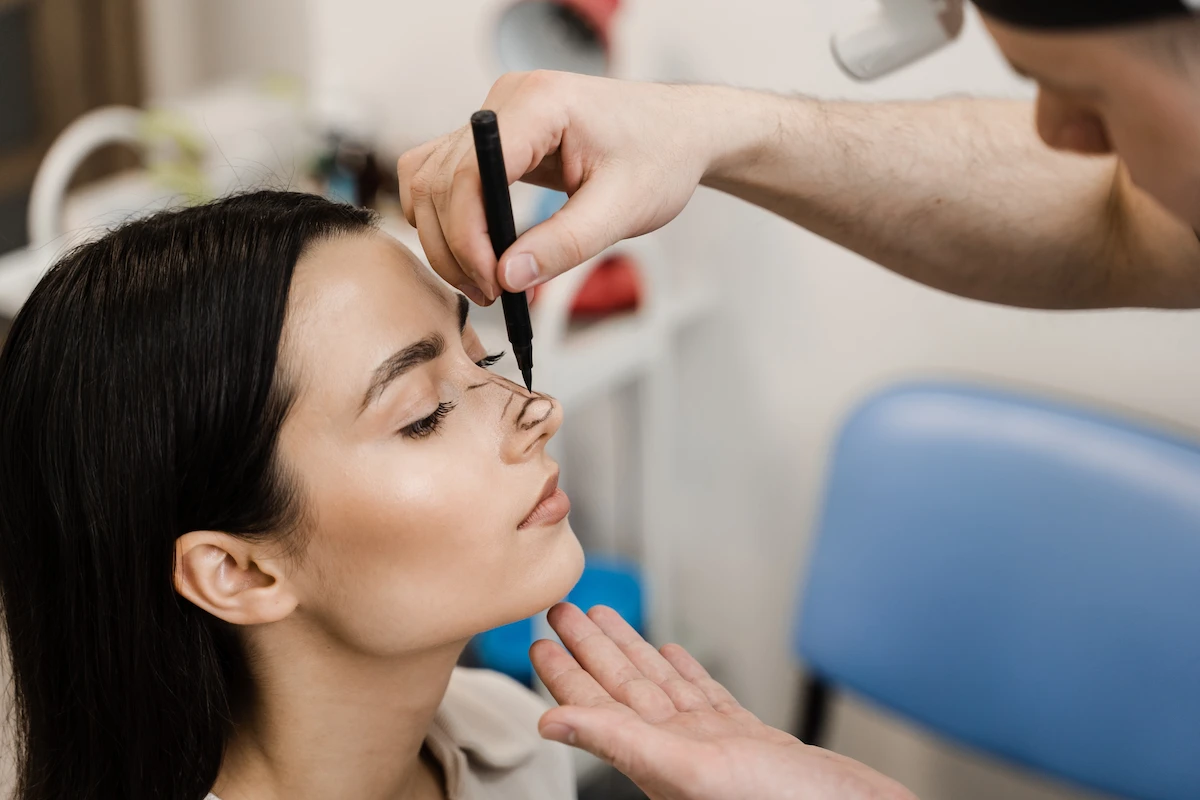How to Fix a Deviated Septum Without Surgery

A deviated septum, a common condition where the nasal septum is crooked, can lead to breathing difficulties and other uncomfortable symptoms. While septoplasty surgery is a common solution, many people wonder how to fix a deviated septum without surgery. This article explores non-surgical approaches, helping you understand your options and when to seek professional medical advice in Miami.
Understanding a Deviated Septum: When the Nose Goes Crooked
A crooked nose can be a sign of a deviated septum, although not all deviated septums cause visible external changes. The nasal septum, a wall of cartilage and bone, divides the nasal cavity into two nostrils. When it’s significantly deviated, it can obstruct airflow.
How to Tell If You Have a Deviated Septum: Recognizing the Symptoms
How to tell if you have a deviated septum? Look out for these symptoms:
- Difficulty breathing through one or both nostrils.
- Frequent nosebleeds.
- Recurrent sinus infections.
- Facial pain.
- Loud snoring.
- Postnasal drip.
- Headaches.
Why Can I Only Breathe Through One Nostril? The Deviated Septum’s Impact
Why can I only breathe through one nostril? A deviated septum is a common culprit. The obstruction can be significant, leading to chronic congestion and difficulty breathing, especially during sleep or exercise.
Deviated Septum Self Test: A Preliminary Assessment
While a deviated septum self test cannot provide a definitive diagnosis, you can perform a simple check:
- Close one nostril and breathe through the other. Repeat on the opposite side.
- Notice if one nostril feels more obstructed than the other.
- Observe if you have any of the symptoms listed above.
If you suspect a deviated septum, consult a doctor for a professional evaluation.

How to Fix a Deviated Septum Without Surgery: Non-Surgical Approaches
While surgery is the only way to physically straighten the septum, non-surgical options can manage symptoms:
- Nasal Sprays: Saline nasal sprays can help moisturize nasal passages and reduce congestion. Corticosteroid nasal sprays can reduce inflammation.
- Decongestants: Over-the-counter decongestants can provide temporary relief from congestion. However, prolonged use can lead to rebound congestion.
- Nasal Strips: External nasal strips can help widen the nostrils, improving airflow.
- Allergy Management: If allergies contribute to congestion, managing allergies with antihistamines or allergy shots can help.
Septoplasty Surgery: When Surgery is Necessary
Septoplasty surgery is recommended when non-surgical treatments fail to provide adequate relief, and the deviated septum significantly impacts breathing and quality of life.
Deviated Septum Surgery Recovery: What to Expect
Deviated septum surgery recovery typically involves:
- Nasal packing for a few days.
- Mild pain and discomfort.
- Swelling and congestion.
- Follow-up appointments to remove packing and monitor healing.
Full recovery can take several weeks.
Primary Doctor in Miami: Your Partner in Nasal Health
If you suspect a deviated septum or are experiencing nasal congestion, consulting a primary doctor in Miami is crucial. They can:
- Perform a physical examination.
- Assess your symptoms.
- Recommend appropriate treatment options.
- Refer you to an ENT specialist if necessary.
Key Takeaways:
- A deviated septum can cause significant breathing difficulties.
- Non-surgical treatments can manage symptoms but cannot straighten the septum.
- Septoplasty surgery is recommended for severe cases.
- Consult a primary doctor in Miami for evaluation and treatment.
Remember, this article is for informational purposes only and does not replace professional medical advice. Always consult with a qualified healthcare provider for diagnosis and treatment.
FAQs: How to Fix a Deviated Septum Without Surgery
- Can a deviated septum correct itself over time?
No, a deviated septum will not correct itself. It is a structural issue and requires either symptom management or surgical intervention to correct. - Are there exercises I can do to fix a deviated septum?
No, there are no exercises that can physically straighten a deviated septum. Exercises may help with breathing techniques, but they won’t change the structure of the septum itself. - How long does it take to recover from septoplasty surgery?
Recovery varies, but most people can return to regular activities within a week or two. Complete healing can take several weeks to months. - Will a deviated septum affect my sense of smell?
In some cases, a severely deviated septum can affect your sense of smell due to chronic congestion and inflammation. - When should I see a doctor about a suspected deviated septum?
You should see a doctor if you experience chronic nasal congestion, frequent nosebleeds, recurrent sinus infections, or difficulty breathing through your nose. A primary doctor in Miami can evaluate your symptoms and provide appropriate treatment options.
Contact Us
Hiriart & Lopez MD, LLC
9950 SW 107th Ave STE 101,
Miami, FL 33176
305-274-8779
Phone: (305) 274-8779
Fax: (305) 274-0646
OPENING HOURS
Monday 7:30 AM–4:30 PM
Tuesday 7:30 AM–4:30 PM
Wednesday 7:30 AM–4:30 PM
Thursday 7:30 AM–4:30 PM
Friday 7:30–11 AM
Saturday Closed
Sunday Closed
OFFICE LOCATION
How to Fix a Deviated Septum Without Surgery

A deviated septum, a common condition where the nasal septum is crooked, can lead to breathing difficulties and other uncomfortable symptoms. While septoplasty surgery is a common solution, many people wonder how to fix a deviated septum without surgery. This article explores non-surgical approaches, helping you understand your options and when to seek professional medical advice in Miami.
Understanding a Deviated Septum: When the Nose Goes Crooked
A crooked nose can be a sign of a deviated septum, although not all deviated septums cause visible external changes. The nasal septum, a wall of cartilage and bone, divides the nasal cavity into two nostrils. When it’s significantly deviated, it can obstruct airflow.
How to Tell If You Have a Deviated Septum: Recognizing the Symptoms
How to tell if you have a deviated septum? Look out for these symptoms:
- Difficulty breathing through one or both nostrils.
- Frequent nosebleeds.
- Recurrent sinus infections.
- Facial pain.
- Loud snoring.
- Postnasal drip.
- Headaches.
Why Can I Only Breathe Through One Nostril? The Deviated Septum’s Impact
Why can I only breathe through one nostril? A deviated septum is a common culprit. The obstruction can be significant, leading to chronic congestion and difficulty breathing, especially during sleep or exercise.
Deviated Septum Self Test: A Preliminary Assessment
While a deviated septum self test cannot provide a definitive diagnosis, you can perform a simple check:
- Close one nostril and breathe through the other. Repeat on the opposite side.
- Notice if one nostril feels more obstructed than the other.
- Observe if you have any of the symptoms listed above.
If you suspect a deviated septum, consult a doctor for a professional evaluation.

How to Fix a Deviated Septum Without Surgery: Non-Surgical Approaches
While surgery is the only way to physically straighten the septum, non-surgical options can manage symptoms:
- Nasal Sprays: Saline nasal sprays can help moisturize nasal passages and reduce congestion. Corticosteroid nasal sprays can reduce inflammation.
- Decongestants: Over-the-counter decongestants can provide temporary relief from congestion. However, prolonged use can lead to rebound congestion.
- Nasal Strips: External nasal strips can help widen the nostrils, improving airflow.
- Allergy Management: If allergies contribute to congestion, managing allergies with antihistamines or allergy shots can help.
Septoplasty Surgery: When Surgery is Necessary
Septoplasty surgery is recommended when non-surgical treatments fail to provide adequate relief, and the deviated septum significantly impacts breathing and quality of life.
Deviated Septum Surgery Recovery: What to Expect
Deviated septum surgery recovery typically involves:
- Nasal packing for a few days.
- Mild pain and discomfort.
- Swelling and congestion.
- Follow-up appointments to remove packing and monitor healing.
Full recovery can take several weeks.
Primary Doctor in Miami: Your Partner in Nasal Health
If you suspect a deviated septum or are experiencing nasal congestion, consulting a primary doctor in Miami is crucial. They can:
- Perform a physical examination.
- Assess your symptoms.
- Recommend appropriate treatment options.
- Refer you to an ENT specialist if necessary.
Key Takeaways:
- A deviated septum can cause significant breathing difficulties.
- Non-surgical treatments can manage symptoms but cannot straighten the septum.
- Septoplasty surgery is recommended for severe cases.
- Consult a primary doctor in Miami for evaluation and treatment.
Remember, this article is for informational purposes only and does not replace professional medical advice. Always consult with a qualified healthcare provider for diagnosis and treatment.
FAQs: How to Fix a Deviated Septum Without Surgery
- Can a deviated septum correct itself over time?
No, a deviated septum will not correct itself. It is a structural issue and requires either symptom management or surgical intervention to correct. - Are there exercises I can do to fix a deviated septum?
No, there are no exercises that can physically straighten a deviated septum. Exercises may help with breathing techniques, but they won’t change the structure of the septum itself. - How long does it take to recover from septoplasty surgery?
Recovery varies, but most people can return to regular activities within a week or two. Complete healing can take several weeks to months. - Will a deviated septum affect my sense of smell?
In some cases, a severely deviated septum can affect your sense of smell due to chronic congestion and inflammation. - When should I see a doctor about a suspected deviated septum?
You should see a doctor if you experience chronic nasal congestion, frequent nosebleeds, recurrent sinus infections, or difficulty breathing through your nose. A primary doctor in Miami can evaluate your symptoms and provide appropriate treatment options.
Contact Us
Hiriart & Lopez MD, LLC
9950 SW 107th Ave STE 101,
Miami, FL 33176
305-274-8779
Phone: (305) 274-8779
Fax: (305) 274-0646
OPENING HOURS
Monday 7:30 AM–4:30 PM
Tuesday 7:30 AM–4:30 PM
Wednesday 7:30 AM–4:30 PM
Thursday 7:30 AM–4:30 PM
Friday 7:30–11 AM
Saturday Closed
Sunday Closed

